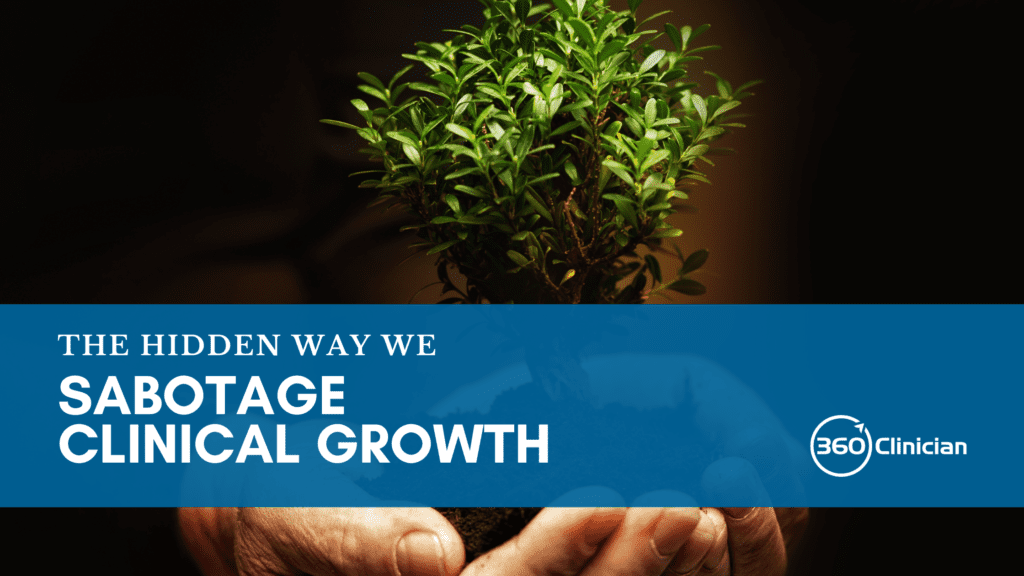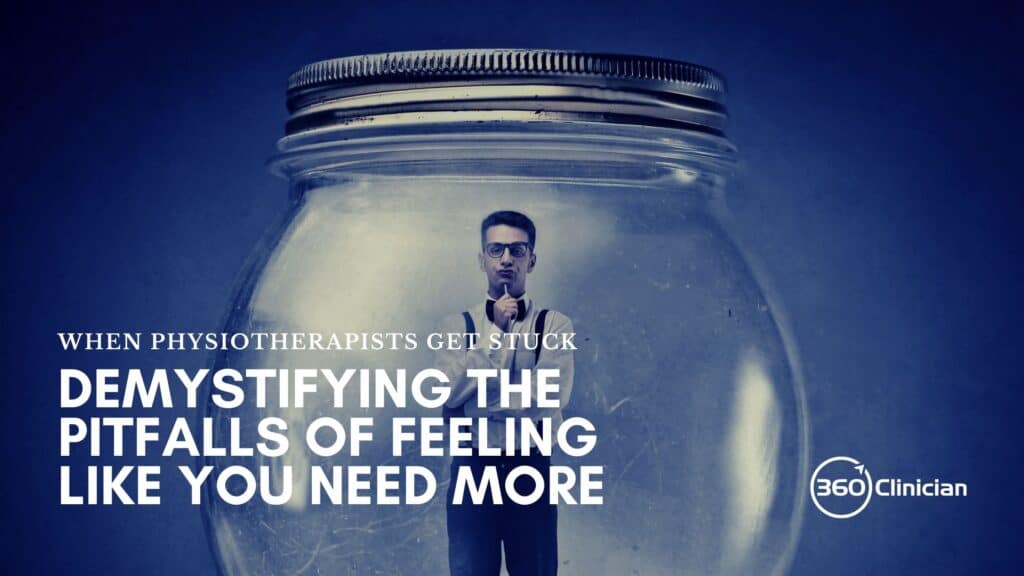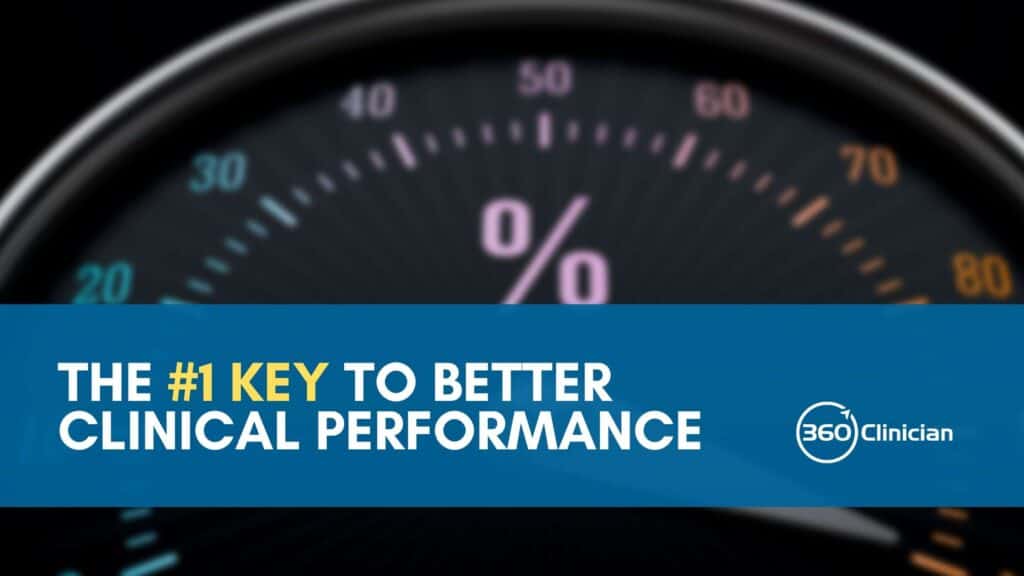I’m embarrassed to share this story.
It was a long time ago and I chalk it up to an underdeveloped mind.
I was 7 or 8 years old and was convinced that a “couple” could mean two or three.
Even when I had older siblings correct me, I would become adamant that I was correct. I’m sure they just rolled their eyes at me.
I wasn’t open to any discussion of the matter. In my mind, it was settled.
Thankfully, I moved past this thinking with a little more growing up.
I was thinking about this story when I thought about how often I can be blind to learning something new because of my need to protect my sense of self.
It wasn’t until I was exposed to a concept called the psychological immune system that I began to understand why I avoided uncomfortable learning experiences.
The psychological immune system (PIS) was first introduced by psychologists Wilson and Gilbert in their research on decision-making. They shared from this article how this immune system is not unlike our physiological immune system:
Like the physiological immune system that fights threats to physical health, people have a psychological immune system that fights threats to emotional well-being.
Here’s a simple visual to help explain it:
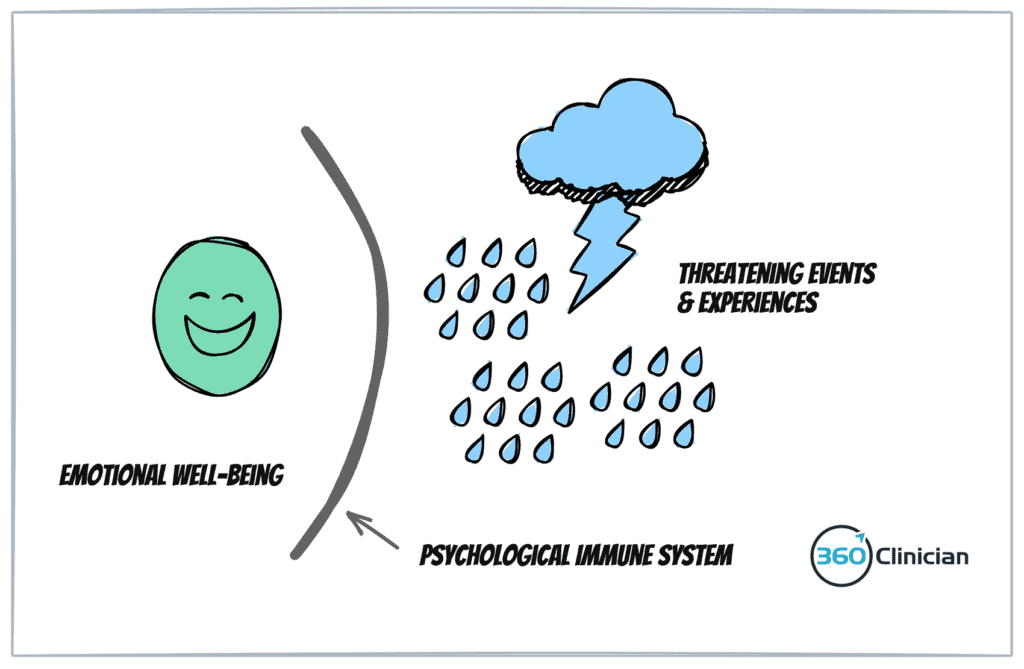
But here’s the rub…
Learning and growth can often be challenging, uncomfortable, and even threatening.
When our psychological defence system maintains our sense of emotional equilibrium, it can actually work against our learning and growth when it stalls our learning through threatening experiences and information (Chapter 6, Handbook of Self-Enhancement and Self-Protection).
Since being introduced to this concept, I finally had language and a framework to understand how I’ve protected my ego at the expense of my growth.
When our ego feels threatened, we can easily deceive ourselves, misplace blame, and trivialize new information. But in our efforts to defend our ego and ‘protect’ ourselves, we miss opportunities for learning and growing as clinicians.
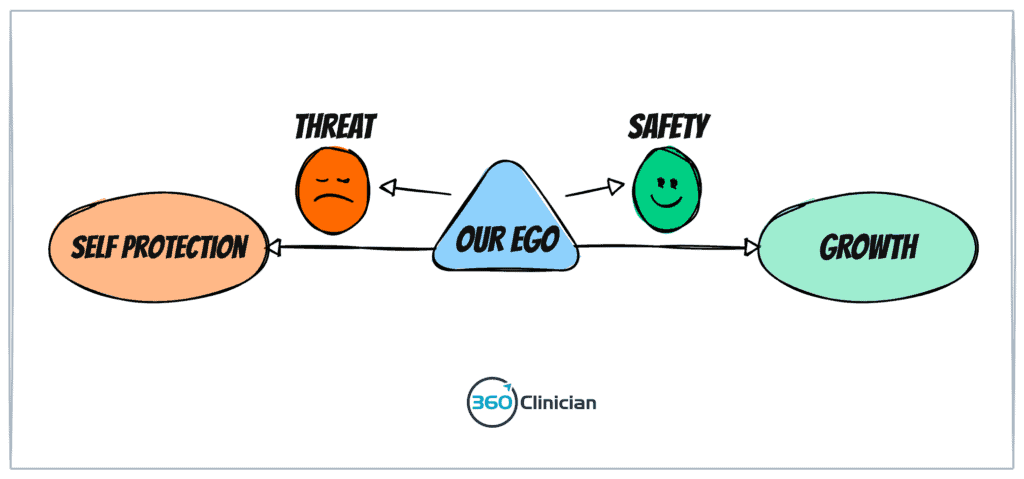
Before I dive into how I’ve stopped sabotaging my growth, I want to highlight some key defence mechanisms that can stymie our clinical progress.
The 4 Traps of the Ego That Sabotage Our Growth
There are so many ways – both conscious and subconscious – that aim to protect our ego and maintain our internal equilibrium. Here are the four that I have found the most common in my own experience:
Trap #1: Isolate myself from outside help
I’ve found my ego defences are active when I consider asking for help. When we were students, there was an expectation that we would ask for help. And there was psychological safety in our role as students asking questions. But the longer I’ve been out of practice, the harder it becomes to maintain a beginner’s mind. That place where we are humble and accepting of not knowing, coupled with having the courage and openness to ask for help from others.
Trap #2: Avoiding learning because of the challenge to my sense of self
Have you noticed how it’s easy it is to have the intention to look something up, but not follow through? We chalk it up to being busy and not having enough time. But from my experience, I’ve noticed that the barrier isn’t always about time, but about my ego.
In some cases, looking something up will require me to confront my lack of knowledge about a topic. As Wilson & Gilbert highlight, our psychological defences are largely unconscious and we can remain largely unaware of their operation.
One example from my clinical practice was a clinical situation where a patient was complaining of persistent shin pain. Because of my focus on other body areas, I put off placing attention on this area of complaint. This meant that I held off referring her for further work-up and imaging. I was disappointed with myself for not being more prompt in my referral. I felt my anxiety increase and my sense of competence threatened.
I knew I needed to do a thorough case review to avoid future issues, but I avoided going deeper with this topic for some time as it forced me to confront this ego-threatening experience.
Trap #3: Avoid Acknowledging Our Limitations
Another strategy I’ve noticed in myself is a tendency to avoid referring to another provider because of the impact on my ego. Sometimes it’s hard to acknowledge and accept that I may not be the best person to solve the patient’s issues and that they need another treatment. Confronting that reality can be an affront to the ego and threatens the psychological immune system. Knowing when to refer to another provider can be a challenging decision, but understanding the reason for avoiding referral is an important step to growth and quality patient care.
Trap #4: Distract Ourselves with Shiny Objects
Another strategy I’ve realized is distracting myself with new information or experiences – falling prey to a variation of the shiny object syndrome. We learn new information or take a course on a new topic because it doesn’t threaten our sense of self. While learning new information can be good, it’s not growth-producing if it’s an avoidance response to placate our ego.
It’s much more exciting and dopamine-producing when we are exposed to new ideas and information. Working through a past patient case where we missed a diagnosis may be a much more growth-giving activity.
I spent a number of years practicing piano and I often was working on classical piano pieces for months on end. Often I got tired of working through a section of music and wanted something new and exciting to work on. But it was in that repeated work that I grew as a pianist.
Another shiny object distraction is consuming social media content. We constantly get small dopamine hits that keep us feeling good and distract us momentarily from feeling threatened (see my blog post here).
Here is a brief summary of the 4 Traps of the Ego:
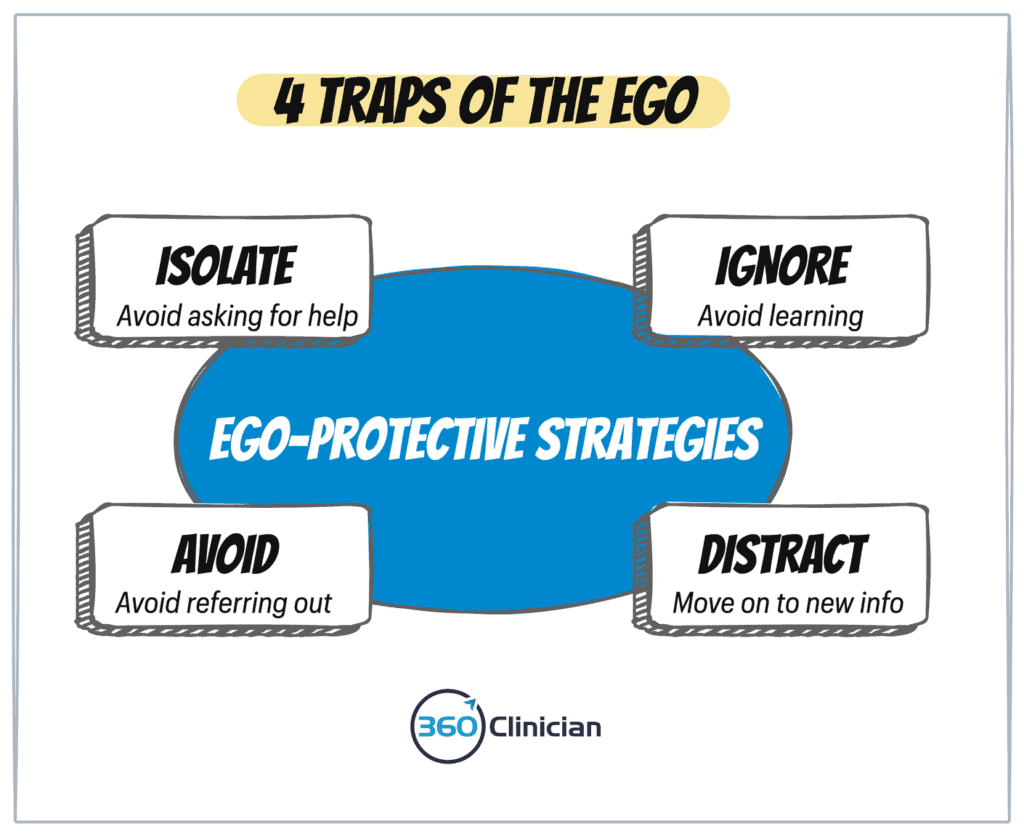
If left untamed, these 4 Traps of the Ego can leave us stunted and stagnant in our professional growth.
But the question is, how can we navigate the often delicate, temperamental nature of our egos and ensure it doesn’t get in the way of us growing and improving?
This work can be challenging.
We’re dealing with emotions and established beliefs that may be coming from the core of who we are.
With that said, it’s necessary work if you’re committed to deeper growth. While it’s challenging work, it does get easier with practice and by following some practical strategies. To help with this, I’ve created 5 strategies to help you move into growth.
Let’s dive in!
#1: Understand Your Ego Protective Traps
First off, it’s important to become aware of the inner workings of your ego. Begin to tune into which of the four traps of the ego you fall into most often.
Writing things down has been such a powerful way to bring clarity to the inner workings of my inner self. It has been instrumental in clarifying my own experience and untangling the yarn of one’s emotional reactions and beliefs.
Here is a simple worksheet (download the pdf here) that can be a useful starting point to get things onto paper. You can use it to identify the feelings that are triggering your awareness that something is threatening your psychological immune system, the specific traps you may be falling for and an opportunity to brainstorm more growth-oriented actions:
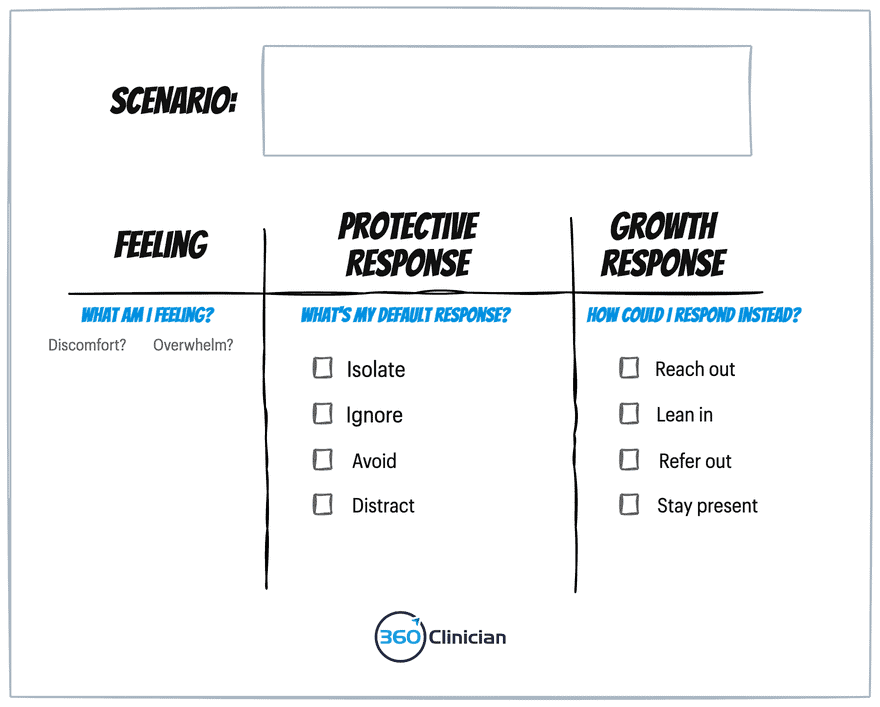
#2: Embrace Discomfort & Vulnerability
An important but difficult step is embracing the inherent discomfort and vulnerability that is present when our psychological immune system is activated. The challenge is that negative or threatening events can challenge our perception of ourselves and how competent we perceive ourselves to be.
Interestingly, research shows that negative, threatening events can actually increase the energy we put into analyzing our situations more than neutral or positive experiences. This increased attention during these times can actually act as a catalyst for deeper learning and growth.
Instead of seeing these triggering situations as something to run from or avoid, I try to reframe them as opportunities for growth. This helps me to better cope with the discomfort that these situations often bring. While the discomfort may be temporary, the growth and personal development that can come from facing these challenges can have long-lasting effects.
#3: Challenge the Self-Talk
In my last blog post, I talked about the important role our self-talk plays in our ability to perform well clinically. Along with the first strategy above, identifying the role our self-talk plays is essential.
For example, cognitive distortions such as all-or-nothing thinking or over-generalization can keep us isolated and can prevent us from taking growth-focused action. To dig deeper, check out my blog post about this.
#4: Be Your Own Coach
When I’ve encountered clinical situations where my ego is challenged and my defence mechanisms kick in, I have found it helpful to be my own coach.
This process focuses on taking a step back from the situation to create a little emotional space to allow deeper reflection and processing. Here are the steps that I’ve found helpful:
1. Acknowledge my discomfort
First off, I’ve found it helpful to acknowledge my own discomfort. The discomfort and threat to the ego are real. By not minimizing the experience, I’ve found it allows me to be receptive to exploring more deeply.
2. Recognize my preferred ego-driven action
Next, I reflect on what I want to default to keep things in balance. Do I want to isolate, avoid, ignore, or distract? More often than not, it’s easy to identify what that action is – it’s the action that you feel will be the easiest and fastest to get out of a state of discomfort.
3. Review how the threat impacts your ego
Next up, I’ve found that understanding what the threat would mean to my ego. For example, by exploring a clinical case where I missed the diagnosis, what is it that I’m saying about myself? Am I telling myself that I’m incompetent? That I’m no good? How does this situation threaten my identity as a person or in my role as a physiotherapist?
4. Challenge myself with a small growth action
Now it’s helpful to identify a small action that will move me to a place of growth. It’s important to keep it small so that it feels less daunting and less threatening to the psychological immune system.
Small action requires less motivation and it doesn’t have to be big. I like to think of an initial action that will get me comfortable with moving into a place of learning and growth.
Examples could include:
- Taking a look at one chart note
- Sending an email to a colleague to set up a time to connect
- Printing off a journal article
5. Celebrate the small growth action
Finally, celebrating a small action is important. Why? Because celebrating a small win helps us feel good, and feeling good helps us to take more uncomfortable action.
#5: Expand Your Sense of Self
It can be hard to be vulnerable when experiencing the disequilibrium of a threatened ego. In my reading in the area of the psychological immune system, I came across a theory of psychology called the Theory of Positive Affirmation. It posits that defining our sense of self-worth outside of the area of threat will bolster our sense of self and protect us from threatening information and situations. This enables us to respond in healthier ways.
This can mean looking at the value of who we are outside of our clinical work. What roles do we have outside of our work (e.g. spouse, friend, parent, caregiver, mentor)?
As Sherman & Cohen highlight, we can think about key elements of our life that are outside of the threat. We can also engage in activities that reinforce values we have that are unrelated to the threatening event.
In essence, we’re building a more robust, multi-dimensional understanding of ourselves so that the threatening experience can have less weight in our lives.
To Wrap Things Up
While it’s easy to fall into the belief that learning and growth is a linear process, it’s anything but. Our ability to understand and navigate our actions of self-defence can pay significant dividends in moving forward into the necessary and important areas we need to grow in.
To greater flow,
Andrew
If you enjoyed this article and want to stay up-to-date on my newest content, sign up for the Clinical Flow Newsletter! There you will have access to special offers, exclusive content, and be part of a growing community of clinicians with the purpose of improving yourself and your clinical practice.
